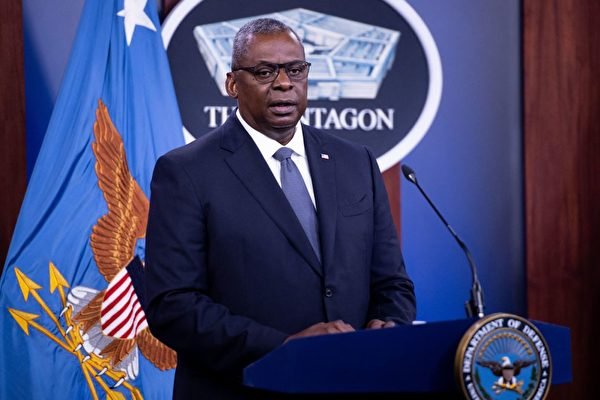On Tuesday, April 16th, U.S. Secretary of Defense Lloyd J. Austin had a video call with Chinese Defense Minister Dong Jun, during which both sides discussed their differing stances on Taiwan and the South China Sea issues. Austin reiterated that the U.S. military will continue to fly, sail, and operate safely and responsibly within the bounds of international law.
This marked the first lengthy discussion between Austin and the Chinese Defense Minister since November 2022. According to a statement released by the Pentagon after the call, the two sides discussed U.S.-China defense relations as well as regional and global security issues, with a focus on the South China Sea, Taiwan Strait, the Russia-Ukraine conflict, and the North Korean threat.
The Pentagon’s statement emphasized Austin’s insistence on the importance of respecting the freedom of navigation in international waters as guaranteed by international law, particularly highlighting freedom of navigation in the South China Sea. Austin also discussed Russia’s unwarranted war on Ukraine and expressed concerns about recent provocations from North Korea.
Regarding the Taiwan issue, the Pentagon stated that Austin reaffirmed the U.S.’s commitment to a longstanding China policy guided by the Taiwan Relations Act, the three U.S.-China Joint Communiqués, and the Six Assurances, emphasizing the importance of peace and stability in the entire Taiwan Strait region.
The Chinese Ministry of National Defense also issued a statement on the call, with Minister Dong Jun stating that the Taiwan issue is a core concern of China and will not tolerate any harm. On the South China Sea issue, Dong Jun emphasized that the U.S. should recognize China’s firm stance and sincerely respect China’s territorial sovereignty and maritime rights in the South China Sea.
Dong Jun, a former commander of the Chinese Navy, was appointed as the Chinese Defense Minister in December last year. Prior to his appointment, the former Chinese Defense Minister Li Shangfu mysteriously disappeared.
An American senior defense official, speaking to the media ahead of the call, stated that the dialogue aimed to ensure that competition with China “does not escalate into conflict.” “We believe that having these open channels of communication is crucial in avoiding any misunderstandings, misinterpretations, misjudgments, or any behaviors that could potentially escalate competition into conflict,” he said.
With Taiwan’s Vice President Lai Ching-te set to assume the presidency on May 20th, both the U.S. and Taiwan are closely monitoring China’s actions. China has been displeased with Lai Ching-te’s election as President of Taiwan, and in recent years, Chinese military aircraft and vessels have frequently intruded into Taiwan’s airspace and waters.
Last autumn, the Pentagon noted an increase in unsafe behavior by Chinese pilots towards U.S. aircraft in the Pacific region; however, a senior U.S. defense official stated on Monday, April 15th, that since November, Chinese behavior has shown some signs of moderation. “However, we have also seen behavior that escalates risk, particularly provocative actions against the Philippines and its waters, especially near Thitu Reef,” he added.
Recent conflicts in the disputed waters of the South China Sea between Chinese and Philippine vessels have escalated, including instances where Chinese coast guard ships fired water cannons at a Philippine resupply vessel, resulting in injuries to several Filipino crew members and damage to the vessels.
Last week, Philippine President Ferdinand Marcos Jr. and Japanese Prime Minister Fumio Kishida visited the U.S. for a historic U.S.-Japan-Philippines summit at the White House, expressing serious concerns about Chinese aggression in the South China Sea. Marcos Jr. also held talks with Austin, discussing China’s provocative military actions in the Indo-Pacific region and reiterating the importance of U.S.-Philippine defense relations.
On April 3rd, U.S. and Chinese military officials held a Maritime Military Consultative Agreement (MMCA) working group meeting in Hawaii, marking the first face-to-face meeting between U.S. and Chinese military officers since December 2021.
Representatives from U.S. Indo-Pacific Command, U.S. Pacific Fleet, U.S. Pacific Air Forces, and 18 Chinese military officials attended the meeting.
This annual meeting aims to reduce air and sea conflicts between the two countries. U.S. officials indicated on Monday that another round of MMCA meetings is expected later this year, with both sides “continuing discussions on future engagements between our senior defense and military leaders.”

